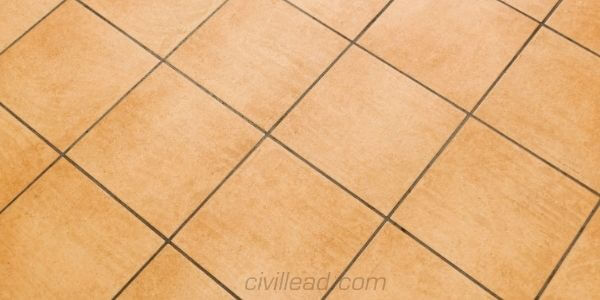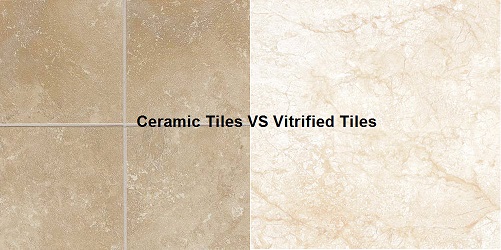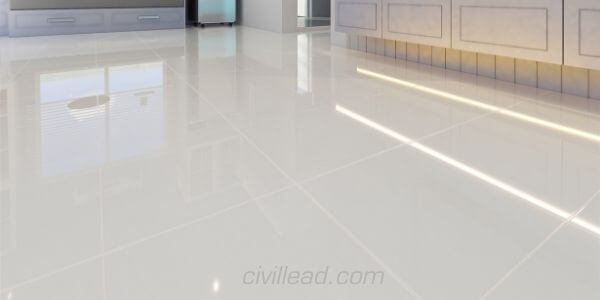Table of Contents
Difference Between Ceramic and Vitrified Tiles
Tiles enhance the beauty of floors and walls. Various options are available in the market and they often confuse the customer while making-a-selection.
Different types of tiles have their own set of advantages and disadvantages and thus it tends to be really frustrating sometimes to conclude something after making the comparison.
Vitrified and Ceramic tiles are often compared as they both are widely used and therefore in this article, we will discuss the difference between these.
So let’s start
Ceramic Tiles vs Vitrified Tiles
Composition
Ceramic tile is made up of earthen clay and water.
Whereas the term vitrified means to convert into the glass-like substance, in this process of vitrification 40% clay and 60% silica is added. Vitrified tiles are made by a mixture of clay, silica, quartz and feldspar which is a constituent-minerals in the granite rock.
Look
Ceramic tiles have a natural and earthen look in comparison to an artificial look of vitrified tiles.
Vitrified tiles have an artificial look as compare to the natural look of ceramic tiles.
Texture
Ceramic tiles are comparatively rough and external glazed is applied for the glass look.
Vitrified tiles are smooth and glossy. It will give you an aesthetic look and it is easy to clean.
Also, Read - Difference Between Double Charged Vitrified Tiles and Polished Glazed Vitrified Tiles
Glazing
Ceramic tiles are always glazed to be protection.
Vitrified tiles need not to be glazed. Shine can be given with mansion polish.

Durability
Ceramic tiles are less durable as compare to vitrified tiles.
Vitrified tiles are more durable as compare to ceramic tiles due to their glass-like surface.
Strength
Ceramic tiles are less strong than the vitrified tiles. Ceramic tiles have low flexural strength which is 20 N/mm2 and low breaking strength which is 200 N.
Vitrified tiles are stronger as compare to ceramic tiles. Vitrified tiles have high flexural strength 35 N/mm2 and high breaking strength that is 700 N.
Also, Read - Difference Between Marble and Granite
Water Absorption
Ceramic tiles are very porous and hence absorbs water quickly so the use of ceramic tiles in the outdoor area will cause the tiles to develop cracks quickly.
Vitrified tiles are nonporous and hence the absorption of water is negligible, so it is most suitable for a wet area.
Frost Resistance
Ceramic tiles have low frost resistance hence these types of tiles absorb water quickly.
Vitrified tiles have high frost resistance because of its water absorption is low as compared to ceramic tiles.

Resistance to Scratches
Ceramic tiles have a low resistance to scratches, so the colour of ceramic tiles do not remain the same throughout its surface over in period-of-time.
Vitrified tiles have more resistance to scratches so even when tiles have scratched the colour of the tiles will remain the same.
Also, Read - 10 Best Tiles Companies In India 2021
Staining Resistance
Ceramic tiles have a low resistance to stains for example when oil falls on the surface of the ceramic tiles, it is difficult t remove to stain of the tile as compared to ceramic tiles due to the texture on top.
Vitrified tiles have high resistance to stain due to non-porosity, glossy finish, and also easy to clean.
Slip Resistance
Ceramic tiles are not as slippery as compared to vitrified tiles. Ceramic tiles can be treated to prevent slipping either by adding an adhesive
Vitrified tiles are very slippery as compared to ceramic tiles. Vitrified tiles are very slippery when wet.
Colour Resistance to UV light
In case of ceramic tiles, direct exposure to sunlight will cause to remove the colour of tiles frequently and the tiles may get fade over-a-period of time.
In the case of vitrified tiles, there is no effect of sunlight as the colour will remain the same over a period of time.

Also, Read - Difference Between Veneer and Laminate.
Cost
Ceramic tiles are cheaper compared to vitrified tiles.
Vitrified tiles are expensive when compare to the cost of ceramic tiles.
Maintenance
The maintenance of ceramic tile is not as easy as compared to vitrified tiles.
The maintenance of vitrified tile is easy because of its shining surface it is easy to clean.
Installation
Installation of ceramic tile is difficult as compared to vitrified tiles. Skilled labour is required.
Installation of vitrified tile is easy as compared to ceramic tiles. They do not require skilled labour.
Also, Read - What is Grouting? Type of Grouting, Advantages, Applications and Process
Size
Usually, the ceramic tiles are available in smaller sizes as compare to vitrified tiles.
Usually, Vitrified tiles are available in the size of 2’ × 2’ and more.
Conclusion
These are the difference between ceramic and vitrified tiles. Both tiles have their advantages and disadvantages. Which one is best? The answer is it depends on your need.
So, friends, I hope I have covered all the differences between Ceramic and Vitrified Tiles in this article.
If you learnt something from this article, please be sure to share it with someone who might benefit from it.
If you want to add any information which has missed in this article, let me know mention it in the comment section.
Finally, Thanks for reading this article.
Also read
10 Best Cement Companies In India
Epoxy Flooring – Type, Uses, Advantages, Disadvantages
What is WPC Board? – Advantages, Disadvantages and Uses.
MDF vs Particle Board – Difference Between MDF and Particle Board
Difference Between Emulsion Paint and Oil Based Paint
Pop vs Putty – Difference Between Pop and Putty
The great explanation between ceramic and vitrified. Can you please tell that which tile is the best between ceramic and vitrified?
Hi, Karthik
Thanks for commenting. I am glad you find my content helpful.
Vitrified tiles are the best for flooring where traffic is high (living room and bedroom) while ceramic tiles are suitable for kitchen, bathroom and stair. Moreover, the choice of tiles depends on the overall look which you want to create. I hope it helps you.